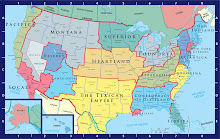
AREA
150,000 sq.m. (10th)
POPULATION
18,392,000 (9th)
DENSITY
122 people per square mile. (11th)
CAPITAL
Nashville, Tennessee
STATES Tennessee (Memphis), Franklin (Knoxville), Kentucky (Louisville), Vandalia (Lexington), West Virginia (Roanoke), Westsylvania (State College).
RELIGION
Protestant, Baptist, various
LANGUAGE
English
NATL INCOME
568 billion
MEDIAN INCOME
$30,874 (17th)
ECONOMY
Appalachia’s economy is fairly weak. Landlocked except for access to the Mississippi river, with extensive mountain ranges on two of its sides, and resisting formal membership to the American Northeast Trade Union, Appalachia is at a disadvantage. Its cities have moderate light industry, but a substantial lack of hi-tech, chemical and finance growth. Its chief agricultural products are cotton, poultry, timber and especially tobacco; in recent times, however, other countries have put in place substantial smoking bans, seriously damaging the Appalachian income. Appalachia is somewhat energy self-sufficient on coal and mining, although it has struck informal deals with Foundrya, and more recently Texico, to import oil. Parts of the mountains and the Nashville area have developed a decent tourist trade. In recent years it has taken to heavily taxing its stretches of the Ohio and Mississippi rivers in order to bolster its economy, to the discomfort of the ANTU nations. The median income is low, but so is the cost of living.
OVERVIEW
Appalachia is one of the weaker nations on the continent, both in terms of economic growth and international relevance. Difficult terrain negatively impacts trade, and a slightly isolationist and traditionalist mindset, as well as four divisive but often indistinct political parties, have led to frustration and an exodus of progressive and scientifically minded citizens to other nations. Appalachia’s trade agreements are largely informal, and its alliances weak in recent years, although it started off as a member of what would eventually become ANTU. In the Redivision of 1994, Appalachia lost most of its land in North and South Carolina, but gained a substantial portion of Virginia, the middle third of Pennsylvania, and some land in Alabama. Its administrations have been characterized mostly by populist politics, with social conservatism often (but not always) defeating economic issues at the polls. President Albert Gore Jr. (Independent, Tennessee) had attempted to transform the country’s energy policy towards total independence, but conservatives opposed to the slightly higher taxes made that an impossibility. The economy hit rock bottom in the administration of Lamar Alexander (Republican, Franklin). Newly elected President Fred Thompson (Independent-Republican, Tennessee) won on a platform of stronger economic policy, including taxing the Mississippi river. There is some concern in ANTU nations that Thompson would be open to an alliance with Texico.
HEAD OF STATE

President Fred Dalton Thompson,
Independent-Republican Party

Vice President Karen Kwiatkowski,
Independent-Republican Party

is robert byrd still alive?
ReplyDelete